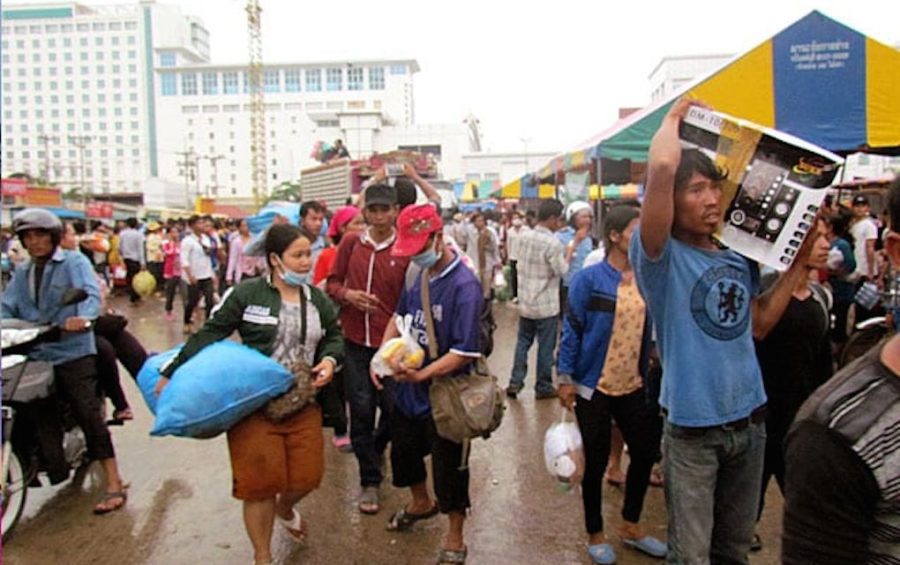While cooking lunch in front of her house in Prey Veng province, Sao Ley, a 25-year-old housewife, recalls her husband’s last trip abroad: two years on a Malaysian fishing boat to earn around $250 a month, depending on the fish catch. It was enough to help sustain the household of eight back home.
He is now applying for a passport so he can return.
“We don’t have money, don’t have jobs here,” Ley said. “We don’t know what to do.”
“Trading nearby is better than trading afar,” a Khmer proverb goes, but Cambodia’s migrant workers who have been stranded at home are aching for the chance to travel abroad again, saying the earnings they make here are too small to cover their costs of living, even accounting for expenses of migration.
Ley said farming was the only option in Svay Antor commune, and it rarely yielded any profit.
She didn’t want her husband to work abroad, away from home, but he felt it was his only opportunity, Ley added.
Pum Chansamath, 46, works as a security guard in Bangkok. He left his hometown in Tbong Khmum in 2014 when he was unable to find a suitable job due to what he said was his limited knowledge; the income was too low to support a living, he said.
“Working conditions in Cambodia are difficult,” he said. “I was forced to live in another country. The income can help support my living, with even some left over.”
He currently makes 14,500 baht a month, or around $430. Starting salaries for security guards is around $7 a day in Cambodia versus $9 a day in Thailand, he said.
He is far from his home and family, but he was willing to stay for better working conditions and salaries, he said, though he hoped the situation might change in the future in Cambodia.
Dy Thehoya, program officer at labor rights group Central, said the draw of migration remained high due to lack of jobs within the country, mounting debt in many households and poor agricultural yields.
However, unskilled migrant workers were vulnerable to labor abuses, he said.
“When they work without skills, they will face jobs of three kinds: dirty, difficult and dangerous,” Thehoya said, adding that such workers were at risk of human trafficking.
Labor Ministry spokesperson Heng Sour could not be reached for comment.
Social development researcher Pa Chanroeun said legal migration had the potential for high salaries and skills development, but cautioned that illegal migration put workers at risk. They could be forced to borrow money for documentation problems, and lacked social protections.
He said he and many people still hoped that local jobs could grow, and the country avoid losing its workers abroad.
“I believe that if there is a lot of work in the district, the working conditions are better, the income is reasonable, I think people still think as in the old words, that trading nearby is better than trading afar,” he said.
Buly Saly, who also lives in Prey Veng, said her sister and her husband and daughter had left to work at a pork factory in Thailand. They had been poor and deep in debt as they struggled with their farm, Saly said.
Now she rarely sees them, though their situation appeared to have improved, she said.
“In three years, he came once and built that house.”













